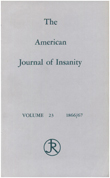Stress-associated reductions of cytotoxic T lymphocytes and natural killer cells in asymptomatic HIV infection
Abstract
OBJECTIVE: Previous research has documented a possible relation of stress and depression to cell-mediated immunity. The authors examined how stressful events and depression may affect key parameters of cellular immunity in subjects with and without HIV infection. METHOD: Data were collected on 99 asymptomatic HIV-positive and 65 HIV-negative homosexual men as part of an ongoing, longitudinal study. Criticisms of previous studies of psychoimmunity were addressed by 1) using a comprehensive, semistructured interview to measure the objective context of stressful events, 2) double labeling of lymphocytes with monoclonal antibodies to measure subsets of cytotoxic/suppressor T lymphocytes and natural killer (NK) cells, and 3) controlling for circadian effects and methodological factors. RESULTS: In the HIV- positive men, severe stress was significantly associated with reductions in NK cell populations and a subset of T cells thought to represent cytotoxic T effector cells, particularly the CD8+ T cells expressing the CD57 antigen. In the HIV-negative men, no clear and consistent relation between stress and immune system measures was found. Depression was not correlated with any variables in either of the groups, perhaps due to the low levels of depressive symptoms. CONCLUSIONS: The findings suggest that stress is associated with reductions in killer lymphocytes (decreased NK cell and cytotoxic T lymphocyte phenotypes). The data provide evidence that stress may alter cell populations that provide cytotoxic defense against infection in HIV-positive men and indicate that the clinical significance of stress- related changes in cytotoxic T lymphocytes and NK cells in HIV infection warrants further study.
Access content
To read the fulltext, please use one of the options below to sign in or purchase access.- Personal login
- Institutional Login
- Sign in via OpenAthens
- Register for access
-
Please login/register if you wish to pair your device and check access availability.
Not a subscriber?
PsychiatryOnline subscription options offer access to the DSM-5 library, books, journals, CME, and patient resources. This all-in-one virtual library provides psychiatrists and mental health professionals with key resources for diagnosis, treatment, research, and professional development.
Need more help? PsychiatryOnline Customer Service may be reached by emailing [email protected] or by calling 800-368-5777 (in the U.S.) or 703-907-7322 (outside the U.S.).



